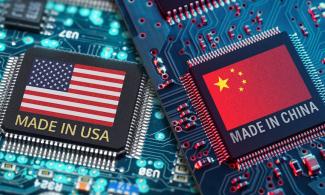
The Chinese leading phone manufacturer, Huawei was banned from accessing US-manufactured chips since 2019 to curb and cripple the company's growing influence around the world.
As world powers gradually drift towards a new cold war, the US Department has published a new package of export restrictions targeting China’s semiconductor industry by further curbing the country’s access to US chip technology.
The new restriction document, published on the Department of Commerce’s website on Friday, includes a ban on exporting to China chips made with US technology and intended for use in artificial intelligence and supercomputers without an export license.
The new restrictions also limit the sale of chip manufacturing equipment and technology to Chinese companies and restrict US citizens and entities from working with Chinese chip producers unless they are granted special permission.
According to the publication, some of the measures will come into force this month, October. The new export controls aim to “prevent sensitive technologies with military applications from being acquired by (China’s) military, intelligence, and security services.”
RT reports that US had earlier on Friday, put YMTC, China's top memory chipmaker, and 30 other Chinese entities on a list of “unverified” companies, meaning that US officials cannot inspect them in order to grant export licenses.
This the report said means the affected firms may later be blacklisted by Washington entirely, effectively barring US companies from supplying them with any technology.
China’s Foreign Ministry spokesperson Mao Ning called the new controls unfair, noting that they would backfire, maintaining that it will certainly “hurt the interests of US companies,” as cited by Reuters.
According to Ning, “In order to maintain its sci-tech hegemony, the US has been abusing export control measures to wantonly block and hobble Chinese enterprises... It will not only harm Chinese companies’ legitimate rights and interests, but also hurt the interests of US companies.
"It will hinder international sci-tech exchange and trade cooperation, and deal a blow to global industrial and supply chains and world economic recovery,” he told reporters on Saturday.
Meanwhile, Taiwan, home to the world's largest contract chipmaker, Taiwan Semiconductor Manufacturing, signaled it would comply with the new US export controls aimed at China, its largest trading partner.
“Taiwan's semiconductor industry has long served global customers and attaches great importance to compliance with laws… In addition to complying with domestic laws and regulations, it will also cooperate with the needs of international customers who place orders and the norms of customers in their countries,” Taiwan's Economy Ministry said in a statement in response to the US announcement, as cited by Reuters.
The Chinese leading phone manufacturer, Huawei was banned from accessing US-manufactured chips since 2019 to curb and cripple the company's growing influence around the world.
The Chinese company has been under fire from the US government, resulting in what is colloquially referred to as the “Huawei ban.” This ongoing battle has forced Huawei to drastically change its business practices.